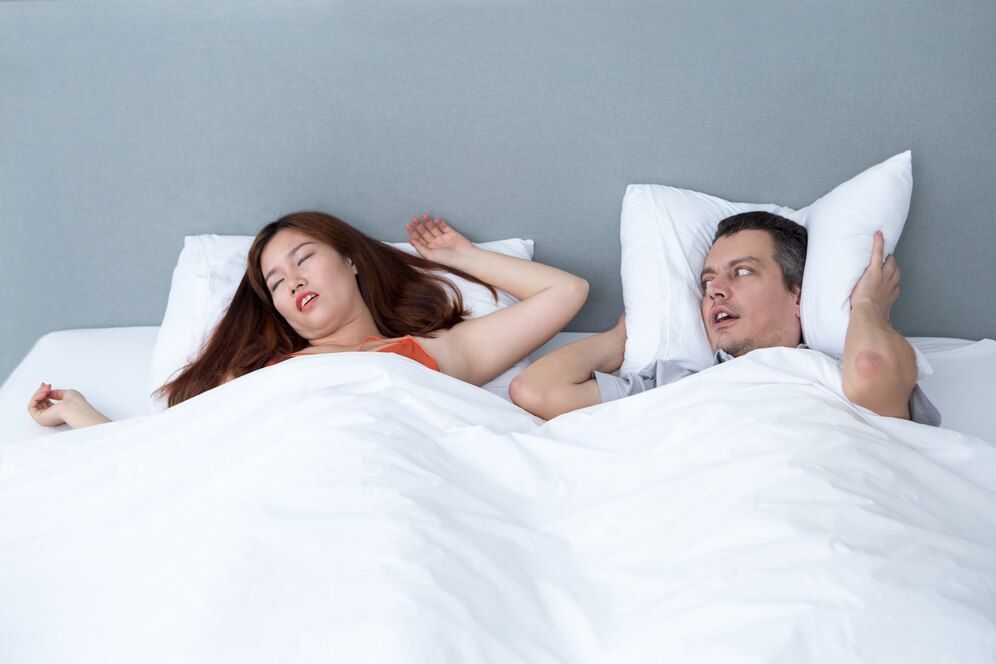Understanding Snoring and Sleep Apnea: Signs, Symptoms, and Treatment

Snoring is a common problem that affects millions of people worldwide. While occasional snoring can be nothing more than a mild nuisance, chronic snoring may be a sign of a more serious underlying issue, such as sleep apnea.
Sleep apnea is a condition characterized by repeated episodes of partial or complete airway obstruction during sleep, leading to disruptions in normal breathing. It's essential to recognize that untreated sleep apnea can have severe consequences on an individual's health, with the potential to lead to hypertension, heart disease, stroke, and various other health complications.
Understanding the connection between snoring and sleep apnea is crucial for determining when to seek professional help. While not all snorers have sleep apnea, a significant portion of those who snore may be experiencing undiagnosed sleep apnea. Failure to address this underlying condition can lead to poor sleep quality, impaired cognitive function, reduced productivity, and increased risk for serious health problems.
By exploring the signs, symptoms, and nuances of snoring and sleep apnea, individuals can better understand when to seek help and learn about the effective treatment options available through dental sleep medicine professionals in Central Pennsylvania.
Distinguishing Between Normal Snoring and Sleep Apnea
While snoring itself is relatively common, differentiating between harmless snoring and sleep apnea can be challenging for some individuals. Normal snoring involves the vibration of respiratory structures and can occur due to various factors such as nasal congestion, obesity or alcohol consumption.
In contrast, sleep apnea is a more serious sleep disorder characterized by repeated episodes of airway obstruction during sleep. Key factors that may differentiate snoring caused by sleep apnea from normal snoring include:
1. Frequency and Intensity: If the snoring occurs frequently, is exceptionally loud or accompanied by choking or gasping sounds, it is more likely to be associated with sleep apnea.
2. Pauses in Breathing: Observers may sometimes notice a person with sleep apnea having intermittent pauses in breathing during sleep.
3. Daytime Symptoms: Excessive daytime sleepiness, difficulty concentrating, irritability or morning headaches can be indicators of underlying sleep apnea rather than just snoring.
When to Seek Help
It's important to seek professional help if any of the following criteria apply to you or your partner:
- Persistent, loud snoring accompanied by choking or gasping sounds
- Witnessed pauses in breathing during sleep
- Struggling with excessive daytime sleepiness, irritability or difficulty concentrating
- Experiencing frequent morning headaches, dry mouth or sore throat
- Having trouble staying asleep or awakening suddenly with chest pain or shortness of breath
If any of these signs are present, it's highly recommended to consult with a dental sleep medicine professional or other sleep doctor for a comprehensive evaluation of your condition.
Dental Sleep Medicine: Effective Treatment Options for Snoring and Sleep Apnea
Dental sleep medicine offers several effective treatment options to improve the quality of sleep for individuals suffering from snoring and sleep apnea. A dental sleep medicine professional can evaluate your specific needs and recommend appropriate treatment methods for your unique situation.
1. Oral Appliance Therapy
Oral appliance therapy is a non-invasive treatment method for sleep apnea that involves the use of a custom-fitted dental device, often a Mandibular Advancement Device (MAD). By gently repositioning the lower jaw and maintaining an open airway during sleep, oral appliances can significantly reduce sleep apnea symptoms and snoring. This therapy is an excellent alternative for those who cannot tolerate or are not ideal candidates for CPAP (Continuous Positive Airway Pressure) therapy.
2. Positional Therapy
For some individuals, sleep apnea symptoms and snoring may be most significant when sleeping in supine (lying on the back) position. Positional therapy involves the use of specialized devices to encourage side sleeping. While positional therapy may not be appropriate as a standalone treatment for all patients, it can be an effective adjunct treatment method in collaboration with other therapeutic approaches.
3. Weight Loss and Exercise
Excess body weight, particularly around the neck and throat, can contribute to snoring and sleep apnea by increasing airway obstruction. Losing weight through a combination of a balanced diet and regular exercise can significantly improve these sleep disorders' symptoms and may even resolve them entirely in certain cases.
4. Lifestyle and Behavioral Changes
Various lifestyle and behavioral changes can positively impact the symptoms of both snoring and sleep apnea:
- Avoiding alcohol consumption and sedatives before bedtime, as these substances may relax the throat muscles and increase airway obstruction.
- Quitting smoking, as smoking can increase inflammation and fluid retention in the upper airway, worsening snoring and sleep apnea symptoms.
- Practicing nasal hygiene by using saline rinses or nasal steroid sprays to manage nasal congestion.
- Adopting healthy sleep habits, such as maintaining a consistent bedtime and waking time, ensuring a dark and comfortable sleep environment, and avoiding stimulating activities or electronics close to bedtime.
The Role of Sleep Medicine Doctor Collaboration
Dental sleep medicine professionals often work in close collaboration with sleep medicine Doctors to provide comprehensive, individualized care for snoring and sleep apnea patients. By working together, dental sleep medicine professionals and sleep medicine doctors can ensure that each patient receives the most appropriate and effective treatment recommendations.
Tackling Snoring and Sleep Apnea Head-On
Understanding the connection between snoring and sleep apnea is the first step towards recognizing when to seek help and take proactive measures toward better sleep quality and overall well-being.
Dental sleep medicine professionals in Central Pennsylvania are committed to providing the highest standard of care for individuals suffering from snoring and sleep apnea, tailored to each patient's unique circumstances and needs.
If you're concerned about snoring, sleep apnea, or any sleep-related issues, reach out to our dental sleep medicine doctors today. Schedule a consultation and embark on a journey towards better sleep and improved overall health.


